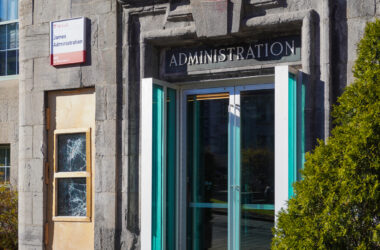Following accusations of unauthorized purchases using company credit cards, Students’ Society of McGill University (SSMU) Vice-President (VP) External Connor Spencer and VP University Affairs Isabelle Oke explained that SSMU has conducted similar transactions in past years. They also noted that SSMU Legislative Council was notified of the purchases far in advance, and that receiving proper authorization was complicated by the absence of a VP Finance at the time.
VP Finance Esteban Herpin, who began his term in January, raised the allegations at SSMU’s Feb. 8 Legislative Council meeting. He claimed that Spencer and Oke misstepped by charging over $4,000 to SSMU credit cards—without approval in SSMU’s operating budget—to host the Association for the Voice of Education in Quebec’s (AVEQ) January Congress at McGill. As a student federation, AVEQ regularly holds congresses for members of the various university student unions it represents or hopes to represent, including SSMU.
Financial Implications
In response to Herpin’s claims, Oke explained to Legislative Council that AVEQ agreed to reimburse SSMU for its costs. Spencer was not present at the SSMU Council in question, but she seconded Oke’s statements in an interview with The McGill Tribune, explaining that this is a normal procedure for AVEQ congresses.
“Normally what happens is the student unions pay for the expenses of the congresses and invoice AVEQ, and AVEQ invoices the other student unions that were there for their costs, which is just food,” Spencer said. “In the end, after all of this is invoiced, only $28 is going to come from SSMU money.”
Isaac Stethem, advisor to the executive at AVEQ, reiterated that it is standard procedure for local student societies to book hotel rooms, conference rooms, and catering for AVEQ congresses. He confirmed that societies are consistently refunded afterward.
“That’s been the standard practice for a number of years,” Stethem said. “It has been the practice for SSMU as well in the past [….SSMU’s expenses] will be 100 per cent reimbursed.”
Herpin was troubled by the lack of transparency regarding Oke and Spencer’s dealings with the January AVEQ Congress.
“It seemed like a very last-minute expense of which no one was informed,” Herpin said. “[Spencer and Oke] could have discussed with accounting, the General Manager, […or] they could have invoiced AVEQ ahead of time. There could have been some kind of structure put in place where they didn’t have to use [SSMU] credit cards. That was the error there.”
Spencer disputed the notion that she and Oke did not make their intentions to host the AVEQ Congress clear.
“I was trying to make Council come to [this congress],” Spencer said. “I made it very clear that this was something that we were doing. There was no VP Finance at the time. I don’t know how else I could have done it.”
Political Implications
SSMU members voted against officially affiliating with AVEQ in the Winter 2016 referendum, but SSMU is still an observing member of the provincial student association. Last fall, Legislative Council postponed a second referendum on AVEQ affiliation due to SSMU members’ insufficient knowledge of the organization and a report detailing criticisms of AVEQ presented by Engineering Senator Tre Mansdoerfer.
“Part of observing is mandating the [VP University Affairs] and the [VP] External to attend [AVEQ] congresses,” Spencer said. “While there isn’t an explicit mention of hosting congresses, that was something done with the intention of making it more accessible to our members in order to [help them] make a more informed decision with this coming affiliation referendum [in March].”
Herpin is concerned that SSMU hosting the AVEQ congress might influence the way that students vote in a future referendum, as it may shift attention from the Union étudiante du Quebec (UÉQ), another provincial student union vying for SSMU’s affiliation.
“To my knowledge we’re not hosting a UÉQ conference,” Herpin said. “It could seem as preferential treatment for AVEQ and this could impact the way certain students feel about it.”
Spencer voiced frustration over Herpin’s choice to present the issue at Legislative Council rather than to discuss it directly with her.
“He knew he was coming into an executive with conflict issues, especially related to people bringing things up in Council rather than in person,” Spencer said. “But I’ve spoken to him about it and made it clear that I didn’t think what he did was ok [….] This is part of my job. It’s me doing my job well.”









